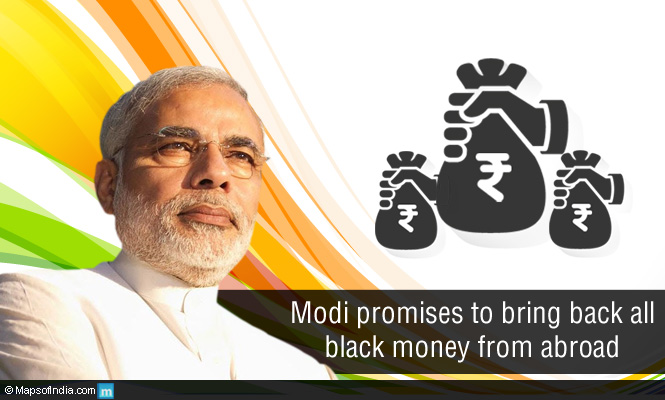Black money is quite a burning issue in India. Prime Minister Narendra Modi keeps mentioning it in his speech. Today again he promised to bring back black money in a programme, ‘Mann Ki Baat,’ broadcast on All India Radio.
Among all, one of the main agendas of the Bharatiya Janata Party (BJP) during election campaign was to bring back black money deposited by Indians in foreign banks. Not only in 2014 but the BJP even worked on the same before the 2009 elections. At that time the BJP made black money as one of the main issues and launched a nationwide campaign against it through a yatra led by none other than L K Advani. Before 2014 elections, senior party leaders promised to bring back the black money within 100 days of the party being voted to power.
Read : Rs 500 and Rs 1000 Notes Banned, New Rs 2,000 Note to be out on 10th November
Till date there is no consolidated data on the amount of black money stashed in foreign countries by Indians but India is one of the leading countries where people keep black money in hideaways. Not only industrialists but politicians and bureaucrats are also involved in such murky activities of depositing huge amounts in foreign banks. As per rough estimates, the amount of India’s black money is approximately 13 times more than the country’s foreign debt. According to a report in the press, the figure is as high as 30 percent of the Gross Domestic Product (GDP). The amount is sufficient to give Rs 1,00,000 each to 45 crore poor people in India. With this money, the Government can clear off all the foreign debt and can then use the surplus money for development works.
India is taking steps in this regard and recently signed tax avoidance pacts with many countries to include provisions on exchange of information (EOI).
What is Double Taxation Avoidance Agreement (DTAA)?
Double Taxation Avoidance Agreement is a bilateral agreement between two countries to avoid taxation of income in two countries. The DTAA helps in promoting trade and lowers tax deduction at source. Experts regarded this as the major cause of black money.
Prevention of Money Laundering Act
The Prevention of Money Laundering Act passed in 2002 to prevent money-laundering also allows to seize property derived by companies or high net worth individuals under money-laundering Act.
Special Investigation Team (SIT)
The Government on the orders of the Supreme Court constituted a Special Investigation Team (SIT) in May this year. The SIT is headed by justice M B Shah (retd) with justice Arijit Pasayat (retd) as its vice-chairman. It was set up for investigating and prosecuting cases pertaining to unaccounted money. Its members include heads of all intelligence agencies and financial probe bodies. Apart from handling cases related to unaccounted money, the SIT will also prepare a detailed plan for creating an institutional structure to deal with black money.
Any person who has information on black money can share it with the SIT. Soon such a channel for communication will be opened for the general public. This step has been taken to widen the chances of detection of illegal money. Within a week’s time the SIT will issue a public advertisement. The common man can also use the Internet and email to pass on any information in this regard.
Soon a portal will also be launched. It is similar to the efforts put in by the previous Government in June 2011. The then Finance Ministry had launched a black money email feedback service with an objective to invite ideas and suggestions from the public. But the SIT this time is interested in actionable information rather than any kind of information.
Recently, the Supreme Court had given the SIT a list of 627 Indians having accounts in the HSBC bank, Geneva. To get crucial information, the Government has also appointed outgoing CBDT Chairman K V Chowdary as an advisor to the SIT.
More information on black money in India
Swizz banks are regarded as the most sought after places for stashing black money. With the Government’s efforts, Switzerland has finally agreed to share information on funds deposited in banks there either to evade tax or to conceal illegal money. Fifty-eight countries across the world have signed the Multilateral Convention on Mutual Administrative Assistance in Tax Matters.
As per the data released by the Swiss National Bank, Swiss banks had Rs 9,000 crore or 2.18 billion Swiss francs of Indians at the end of 2012. The 2.18 billion Swiss francs was deposited directly by Indian individuals and entities and the rest through wealth managers or through fraudulent means. The total amount all across the world is Rs 90 lakh crore.
As far as black money is concerned, India ranks eighth among top ten developing countries. The real estate sector is the major sector with the largest holders of black money and unaccounted funds.
Recent Updates
- The government announced that the declaration of assets under the black money compliance window is worth Rs. 4,417 crore as made by 638 declarants.
Read More…
How to Convert Black Money into White
Rubbing salt worth Rs 400/kg into people’s wounds?






